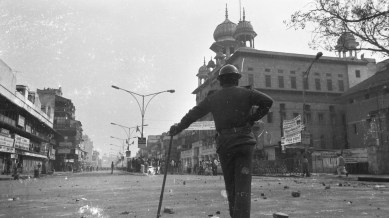Stay updated with the latest - Click here to follow us on Instagram
Anti-Sikh riots: Four decades on, just 12 murder cases have ended in conviction
Senior advocate H S Phoolka, who is fighting cases on behalf of the victims in Delhi, said: “The number of commissions and committees set up to probe the murders... is more than the number of convictions.”

Exactly four decades after more than 2,700 Sikhs were killed in Delhi in the riots that broke out across the country following the assassination of Prime Minister Indira Gandhi on October 31, 1984, by her Sikh bodyguards, just 12 murder cases have ended in conviction.
Senior advocate H S Phoolka, who is fighting cases on behalf of the victims in Delhi, said: “The number of commissions and committees set up to probe the murders… is more than the number of convictions.”
monthly limit of free stories.
with an Express account.
One such commission was the G T Nanavati Commission, set up in 2005 by the Atal Bihari Vajpayee-led NDA government. According to its report, 587 FIRs were registered in Delhi in relation to the riots.
While 241 of these have been filed as untraced, 253 ended in acquittal. Of the remaining, 40 FIRs are pending trial and one is pending investigation. Eleven FIRs have been quashed, and in 11 other FIRs, the accused have been discharged. Three cases have been withdrawn.
To date, just 27 cases have ended in convictions. Of these, just 12 are convictions in murder cases.
About a fifth of these FIRs (108) were lodged in South Delhi. Another 98 and 96 were filed in East and Northeast Delhi respectively. West and Northwest Delhi both had 66 FIRs each. North Delhi and Central Delhi had 39 and 46 FIRs registered respectively. Another 51 were registered in Southwest Delhi. Just 10 FIRs were registered in New Delhi. Seven other cases were registered under ‘crime and railways’.
“The reason for the slow progress in cases is that the whole system was shielding the accused… all those who followed orders were protected…,” claimed Phoolka.
Similarly, an SIT was constituted by the MHA on February 12, 2015, after the Centre asked former Supreme Court judge, Justice G P Mathur, to examine the possibility of constituting an SIT to re-investigate the 1984 cases.
The goal of the SIT was to “re-investigate appropriately” “serious” criminal cases that had been filed in Delhi but were closed. Following this, 293 cases that had been closed, and for which untraced reports were filed, were scrutinised. After going through case records for months, the SIT closed 199 cases primarily because of “incomplete, illegible” records or lack of witnesses.
In 60 cases, the SIT launched a preliminary enquiry. Of these, 52 ended in closures due to a lack of evidence or witnesses. Police filed a chargesheet in five of the remaining eight cases. In one case which was going on in Rohini court, the accused was acquitted — an appeal against this is pending in the Delhi High Court. Another case is pending in Karkardooma court.
Phoolka said that around 20 cases related to the riots are pending across Delhi courts. Three are pending against former Congress MP Sajjan Kumar in Rouse Avenue court, two appeals against his acquittals are pending in the HC, and one appeal against his conviction in one case is pending in the SC.
Kumar is currently lodged in Tihar Jail after he was sentenced to life imprisonment by the HC in 2018 in a case related to the killing of five Sikhs at Raj Nagar Part I in Palam Colony on November 1-2, 1984, and the burning down of a gurdwara in Raj Nagar Part II.
On August 30 this year, Judge Rakesh Syal of Rouse Avenue court ordered the framing of charges against Congress leader Jagdish Tytler under IPC sections 302 (murder), 109 (abetment), 147 (rioting), 153A (promoting enmity between groups) and 143 (unlawful assembly) for the killing of three Sikhs during the riots near Pul Bangash Gurdwara. The trial in this case has begun and Tytler has moved a petition in the HC against the charges.
“It is necessary that every person in power has the fear of law… their power should not make them feel that they’re above the law,” said Phoolka.
In another case where two accused were convicted – one got a death sentence and the other life imprisonment – appeals filed by them are pending before the HC.
In 2017, the HC issued show-cause notices to accused persons in five cases linked to the anti-Sikh riots, asking them why the cases against them should not be re-tried. The court had set aside a 1986 judgment in which cases pertaining to the riots were closed.